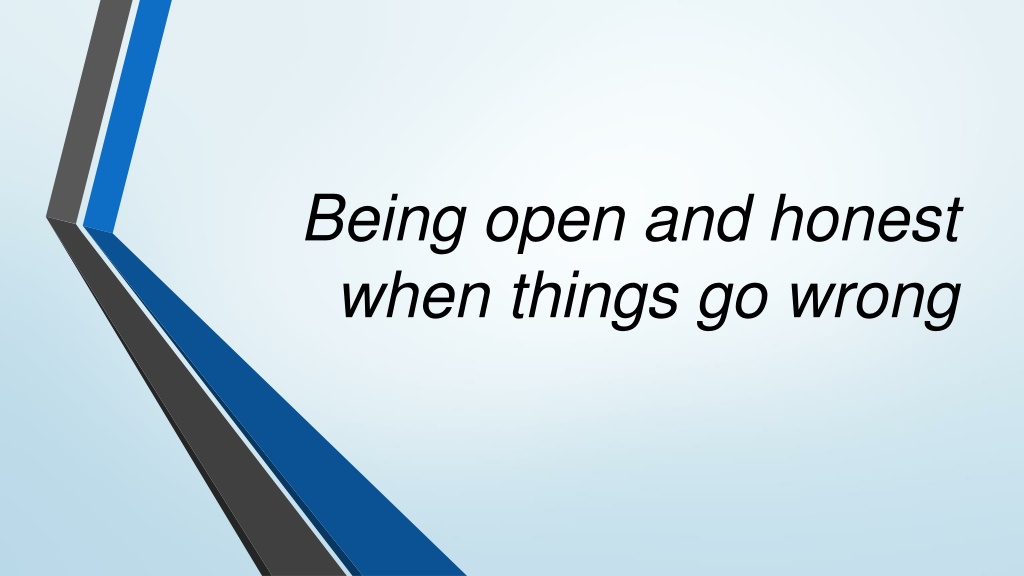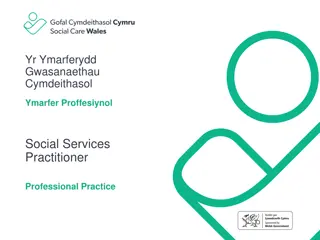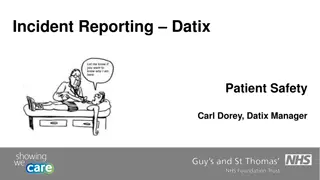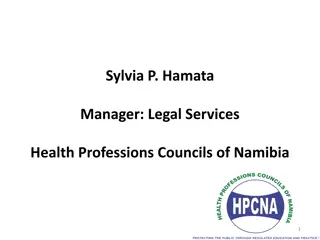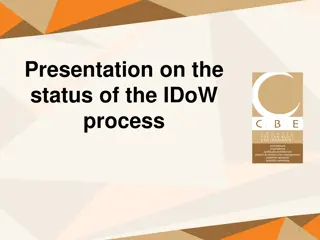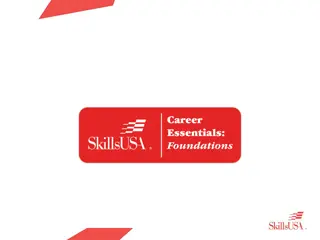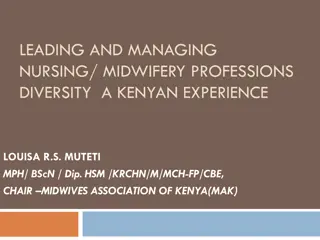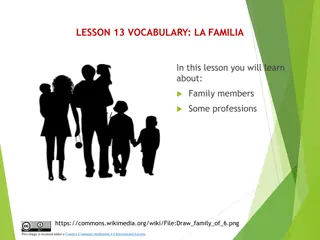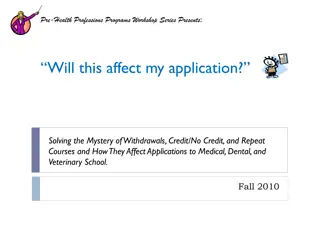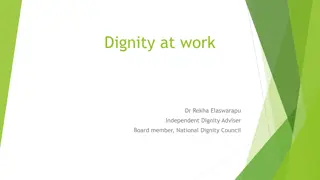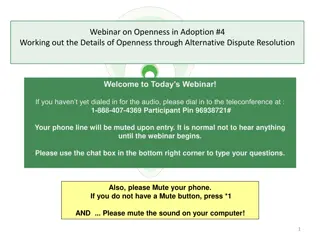Importance of Openness and Honesty in Healthcare Professions
Explore the significance of being open and honest in healthcare when things go wrong, understand the Duty of Candour, and discuss the challenges individuals face in such situations. Discover the 15 healthcare professions regulated by the HCPC and the standards that outline expectations for professionals in the field. Stay updated with the latest standards and work within the ethical framework set by the HCPC.
Download Presentation

Please find below an Image/Link to download the presentation.
The content on the website is provided AS IS for your information and personal use only. It may not be sold, licensed, or shared on other websites without obtaining consent from the author. Download presentation by click this link. If you encounter any issues during the download, it is possible that the publisher has removed the file from their server.
E N D
Presentation Transcript
Being open and honest when things go wrong
Learning objectives To look at the principles of being open and honest when things go wrong, including the HCPC (Health and Care Professions Council) standards around this. To understand the meaning of Duty of Candour. To understand the importance of being open and honest within healthcare. To discuss challenges that individuals may face around being open and honest when things go wrong. To gain awareness what to do in the event of something going wrong.
Firstly, who are our Healthcare professionals that are regulated by the HCPC? Do you know the 15 healthcare professions that are regulated by the HCPC? (HCPC, 2018)
Biomedical scientists Biomedical scientists Chiropodists / podiatrists Chiropodists / podiatrists Arts therapists Arts therapists Clinical scientists Clinical scientists Biomedical scientists Chiropodists / podiatrists Firstly, who are our Healthcare professionals that are regulated by the HCPC? Operating department practitioners Operating department practitioners Occupational therapists Occupational therapists Hearing aid dispensers Hearing aid dispensers Dietitians Dietitians Operating department practitioners Hearing aid dispensers Occupational therapists Operating department practitioners Practitioner psychologists Practitioner psychologists Orthoptists Orthoptists Paramedics Paramedics Physiotherapists Physiotherapists Practitioner psychologists Speech and language therapists Speech and language therapists Prosthetists / orthotists Prosthetists / orthotists Radiographers Radiographers Speech and language therapists Prosthetists / orthotists Speech and language therapists Does your career/future career fall into one of these categories? (HCPC, 2018)
All of the healthcare professionals and students that fall under regulation by the HCPC have standards that detail what is expected of the healthcare professionals. They are regularly updated, so those regulated should stay up to date with the latest standards. These are available to read here- Standards | (hcpc-uk.org) (HCPC, 2022). Including standards of proficiency for each of the healthcare professional categories. All healthcare professionals should work within the ethical framework set by the HCPC. In relation to this session, the standards include- Being open when things go wrong Be honest and trustworthy (we will come back to these in more detail!) (HCPC, 2016)
Is it okay for things to go wrong for a training healthcare professional? ? ? ? ? ? ? ? ? ? ?
Is it okay for things to go wrong as a qualified healthcare professional? ? ? ? ? ? ? ? ? ? ?
When something does go wrong, who should be made aware? Your co- workers? ? We will come back to this
Duty of Candour What is duty of candour? The duty of candour requires registered providers and registered managers (known as registered persons ) to act in an open and transparent way with people receiving care or treatment from them. (Care Quality Commission (CQC), 2022). Duty of candour comes under the Health and Social Care Act 2008 (Regulated Activities) Regulations 2014: Regulation 20. (2014) (and is explained well in a reader friendly way on the CQC website!: Regulation 20: Duty of candour - Care Quality Commission (cqc.org.uk) (CQC, 2022).
There are two types of duty of candour- Statutory Professional Since 2014, organisations registered with the CQC in England have a statutory duty of candour (Royal College of Nursing (RCN), 2022). All healthcare professionals must be open and honest with people in their care when something goes wrong and causes, or could cause, harm or distress. Reporting to the service user or relatives if there has been a notifiable safety incident . This refers to any unintended or unexpected incident that has or could have resulted in death, severe harm, moderate harm or prolonged psychological harm (General Medical Council (GMC) and Nursing and Midwifery Council (NMC), 2022). Health and care professionals must also be open and honest with their colleagues, employers, regulators and relevant organisations- this includes taking part in reviews and investigations (GMC and NMC, 2022).
Duty of Candour and HCPC standards Closely linked with Duty of Candour; included within the HCPC standards of conduct, performance and ethics are: Standard 8- be open when things go wrong This standard is very much based around being open with service users when things have gone wrong. This includes- Informing the service users or their carers that something has gone wrong. Apologising for it. Putting matters right where you are able to. Making sure that they receive a full explanation, including any effects that could arise from this. It also covers the requirement of supporting service users with their rights to complain. Standard 9- be honest and trustworthy This standard includes making sure that your conduct is aligned with the trust put in you by the public as a professional. It also details that you should be compliant when involved any investigations taking place in regards to your competence or conduct. Please note that these standards also apply to students and a separate document is available Guidance on conduct and ethics for students | (hcpc-uk.org) (HCPC, 2016)
Sogoing back to the previous question When something does go wrong, who should be made aware? Speaking to a co-worker can be beneficial in that they can offer you support regarding the incident. Your co-worker may also be able to guide you through the processes that you need to follow. Health care professionals must also support and encourage each other to be open and honest, and not stop someone from raising concerns. (NMC, 2022) Your co-workers? Your line manager? Your department manager? It is really important that you discuss things with your management as they may be able to put support in place and look at the reasons behind the incident occurring and ways in which this could be prevented from happening again. Was it a lack of training? Or the environment? Student healthcare workers should also include their education providers in any discussions. Having these discussions will aid you in reflecting on the incident which is a big part of learning and being a healthcare worker.
As per the duty of candour and HCPC standards, it is absolutely essential that the service user involved is made aware of any incidents that occur that involve them. The service user involved? The service user s family/carers? The NHS constitution advises service users that they have the right to an open and transparent relationship with the organisation providing your care. (NHS resolution, 2017) Dependant on the needs of the service user, it may be appropriate for a family member or carer to be made aware of the incident.
Challenges What are some challenges that you can think of that may affect someone who has to report something that has gone wrong?
Examples of Challenges Fear of litigation and regulators Blame culture Criticism or judgement from colleagues Feeling like an annoyance to senior staff (HCPC, 2021)
It may be scary, but it can also- 1 2 3 4 5 Be a learning opportunity Be a reflective opportunity Keep everyone safe Prevent the incident from happening again Highlight training needs (Clarke, 2019)
Explain to the service user or their carers what has happened, including apologising . Taking any action to rectify the mistake if this is possible. So what should you do when things do go wrong? Find out what your employer or placement departmental policies state- are there specific steps to take and people to contact. Is there a specific reporting system that you can document what has happened? Speak to your manager, not only to make them aware but also for advice and guidance. Seek advice from regulators. Comply with any action that is taken to investigate what has gone wrong.
An Important Thing to Remember- Saying sorry is not admitting fault We have covered how important it is to apologise and the challenges this could present for individuals in relation to worries of what will happen in response. Saying sorry is: always the right thing to do not an admission of liability acknowledges that something could have gone better the first step to learning from what happened and preventing it recurring (NHS Resolution, 2017)
Is it okay then, if things go wrong for a training professional or a qualified professional?
In a nutshell- its how you deal with the situation that matters. When things go wrong, service users, employers and the regulator want to make sure it won t happen again, and so the key is recognising that you ve made a mistake. (Clarke, 2019)
Now you have more insight: A case study based on students https://youtu.be/KFisdBqa19M
Take home messages Things can go wrong for any of us- we are only human! It s how you respond that matters. Regulatory bodies aren t there to scare you- they provide standards, information on training opportunities and advice which will support you right through from being a student into your career and more. Don t be scared to report when something has gone wrong- by being brave and speaking up you can learn, reflect and evoke change.
Any Questions? ? ? ? ? ? ? ? ? ? ?
References Care Quality Commission (2022) Regulation 20: Duty of Candour Available at: https://www.cqc.org.uk/guidance-providers/all-services/regulation-20-duty-candour/ [Accessed 25th August 2022]. Clarke (2019) When something goes wrong, openness is in everybody s best interests. Our Standards [blog] 23rd July. Available at: https://www.hcpc-uk.org/news-and- events/blog/2019/when-something-goes-wrong-openness-is-in-everybodys-best-interests/ [Accessed 30th August 2022] General Medical Council and Nursing and Midwifery Council (2022) Openness and honesty when things go wrong: the professional duty of candour. [pdf] Available at: https://www.nmc.org.uk/globalassets/sitedocuments/nmc-publications/openness-and-honesty-professional-duty-of-candour.pdf [Accessed 25th August 2022] Health and Care Professions Council (2016) Standards of conduct, performance and ethics. [pdf] Available at: https://www.hcpc-uk.org/standards/standards-of-conduct- performance-and-ethics/ [Accessed 25th August 2022] Health and Care Professions Council (2017) Conduct and ethics for students - Being open when things go wrong [video] Available at: https://www.youtube.com/watch?v=KFisdBqa19M [Accessed 31st August 2022] Health and Care Professions Council (2018) Professions and protected titles. Available at: https://www.hcpc-uk.org/about-us/who-we-regulate/the-professions/ [Accessed 20th August 2022]. Health and Care Professions Council (2022) Standards. Available at: https://www.hcpc-uk.org/standards/ [Accessed 20th August 2022] Health and Care Professions Council (2021) #MyHCPCStandards webinar series: Standard 8 - be open when things go wrong [video] Available at: https://www.youtube.com/watch?v=R1VvOJ9hjHA&feature=emb_imp_woyt [Accessed 24th August 2022] National Health Service Resolution (2017) Saying sorry. [pdf] Available at: https://resolution.nhs.uk/wp-content/uploads/2018/09/NHS-Resolution-Saying-Sorry.pdf [Accessed 24th August 2022] Royal College of Nursing (2022), Duty of candour. Available at: https://www.rcn.org.uk/get-help/rcn-advice/duty-of-candour [Accessed 22nd August 2022] The Health and Social Care Act 2008 (Regulated Activities) Regulations 2014, SI 2014/2936, England, National Health Service, Public Health and Social Care.
